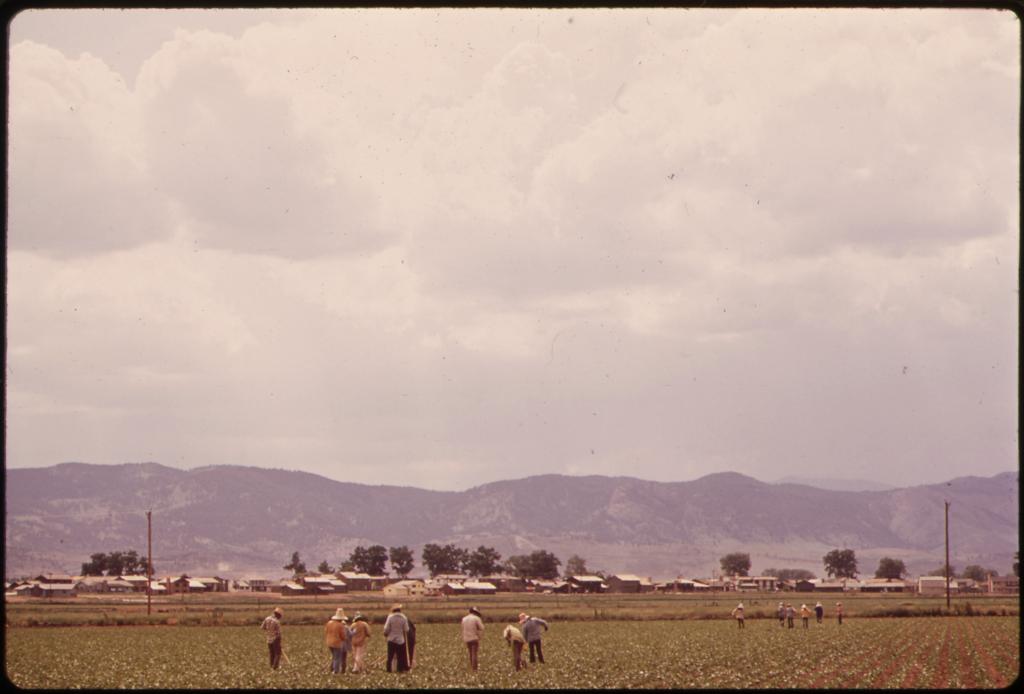By Guest Writer Anna O’Neil
At least half of my toddler’s books take place on the farm. The sky is blue, the barn is clean, and Old Macdonald whistles while he picks apples and weeds the vegetable patch. Of course, the sky is blue wherever you go, but the rest of that story is a myth. In America, the farm is not generally a happy place to be.
It’s not a secret. The U.S. Department of Labor cites agriculture as one of the most dangerous industries to work in. Of the 2.5 to 3 million farmworkers in America, half a million are under 18, (Children as young as 12 are legally allowed to work in these fields.) More than half of farmworkers are undocumented immigrants with no legal recourse to improve working conditions. The women in the industry often resort to dressing as men to escape the rampant sexual harassment and abuse they regularly encounter. Pesticide poisoning, heat stroke, substandard living conditions, lack of access to clean water, all of this and more is a part of their daily life.
The system has been called modern day slavery, for good reason. For all their work, according to the Farmworker Advocacy Network, the worker’s average annual income is only $11,000, or $16,000, for a family. Loopholes, such as paying workers based on how much they pick, get around minimum wage laws, and at the same time, penalize workers for taking any breaks. There’s a reason that heat stroke is the “leading cause of work related death” among farmworkers.
These people are tremendously vulnerable, and they’re being exploited by a system that commotifies human lives in order to meet our demand for cheap, varied, fresh food, in season and out. I’m not trying to make the case that it’s wrong to buy from supermarkets, whose prices usually rely on this system being the way it is. We need to feed our families.
At the same time, Pope Francis has made it very clear that our duty towards protecting the unborn, who are so uniquely vulnerable, extends to all the most vulnerable among us, including the exploited, commodified poor. “Our defense of the innocent unborn,” he writes in Gaudete et Exsultate “needs to be clear, firm and passionate, for at stake is the dignity of a human life. … Equally sacred, however, are the lives of the poor, …the victims of human trafficking, new forms of slavery, and every form of rejection. We cannot uphold an ideal of holiness that would ignore injustice in a world where some revel, spend with abandon and live only for the latest consumer goods, even as others look on from afar, living their entire lives in abject poverty.”
We can’t ignore the injustice that’s built into our mass produced food system. Still, there’s rarely only one right way to respond to injustice. I pray for the unborn, but I don’t have the mental and physical energy to do what it takes to offer them direct help. I don’t have the ability to lobby in the legal sphere, or the time to volunteer at a crisis pregnancy center. I can only do what I can do.
So no, I’m not insisting everybody has to turn their budget inside out in order to take support and demand away from these massive, abusive corporations. Only you know what’s right for your family, and short of becoming completely self-sufficient, I can’t think of a way to distance yourself one hundred percent.
But is there a Farmer’s Market near you? Even though it’s more expensive than we’re used to, a lot of them accept EBT benefits, and even more of them take WIC. Or could you sign up for a Community Supported Agriculture program? Can you look locally for what’s in season, when it’s least expensive, and then freeze, can, or dry it? Supporting local agriculture might not be as far out of reach as it initially seems.
This is not just a boycott. It’s not just that you’re taking your dollars away from corporations which perpetuate systemic abuse, by their greed. You’re moving that money, using it to support the people in your own community, the ones who are doing it right. Nobody struggles to keep their small farm afloat for the lucrative payout and ample vacation time. They do it because it matters to them, and because it’s a labor of love.
If it’s possible for you to buy more locally, even if you’re just making a few small changes, understand that these actions are essentially and authentically pro-life. Mother Theresa said, “Never worry about numbers. Help one at a time, and always start with those nearest you.” Supporting local is a very real way to uphold the dignity of all life, starting in your own community.
image credit: https://commons.wikimedia.org/wiki/File:MIGRANT_WORKERS_IN_FIELD_-_NARA_-_543845.jpg













